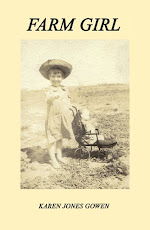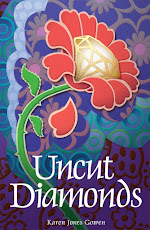This post is to answer Donna, who has collected mountains of information for her father's memoir. Since I'm in publishing, I tend to use literary terms that may not be helpful to those who want to write a life story rather than write for an audience. Terms like voice, narrative flow, tone and point of view don't matter in that case.
So this post is for those wanting to record a life history for family and posterity, not for publication. If that is you, and you already have the collected records, photos, letters, journals, not to mention your own memories-- then you are half way there. As I've said before, it's the collecting that takes the most time, but it's where the work should begin.
Then you must organize your material into usable files, either on the computer or in envelopes, folders or boxes, whatever works best for you. Word perfect is one of the easiest programs to use for those who are used to the "typewriter." Haha, remember that old thing? Oh how I have loved the typewriters of my life! This looks like the one I wrote my stories on as a child.
And then there's the last one I owned, that I started Uncut Diamonds on ten years ago, back when it had a different title, different POV, different tone and wasn't even a novel lol! It was just excerpts from my old journals, organized in a way that I thought might make a story.
This is an IBM Selectric. Pretty cool, huh? Mine got donated to charity when I finally was able to let it go. Now I love my laptops. I'm on my fourth, and the only one that was bought new.
But let's say you have files of diaries and letters-- what will you be writing? I would suggest keeping those for later and starting with recording your memories. Just write and let it flow, in whatever format feels most comfortable. You might start with arranging them into "chapters," such as childhood, teen years, school days, vacations, meals and home routines, games and recreation, illnesses.
When you have poured everything out and have a huge file of your written memories, you can add to it from other files, like letters, photos, and whatever else is in your collection. The main thing is to get the words down, without worrying about how they sound, or grammar, or anything like an English teacher or an editor might frown upon.
This is your story, so write it in your way. It may take awhile to get past the mental roadblocks:
*this sounds stupid*
*I don't know how to use commas*
*this is too much work*
*who will ever read this?*
*does it even make sense?*
*I wish I were a better writer*
Let me assure you that even those who write for a living have these doubts about their work on a regular basis.
Subscribe to:
Post Comments (Atom)














Well said.
ReplyDeleteI know you've told me before!
ReplyDeleteI've got to get busy...
Great and sound advice!
ReplyDeletep.s. I love my olivetti electronic typewriter - I can't bear to part with it!!
Take care
x
I just finished my memoir. These are excellent suggestions for those about to start.
ReplyDelete